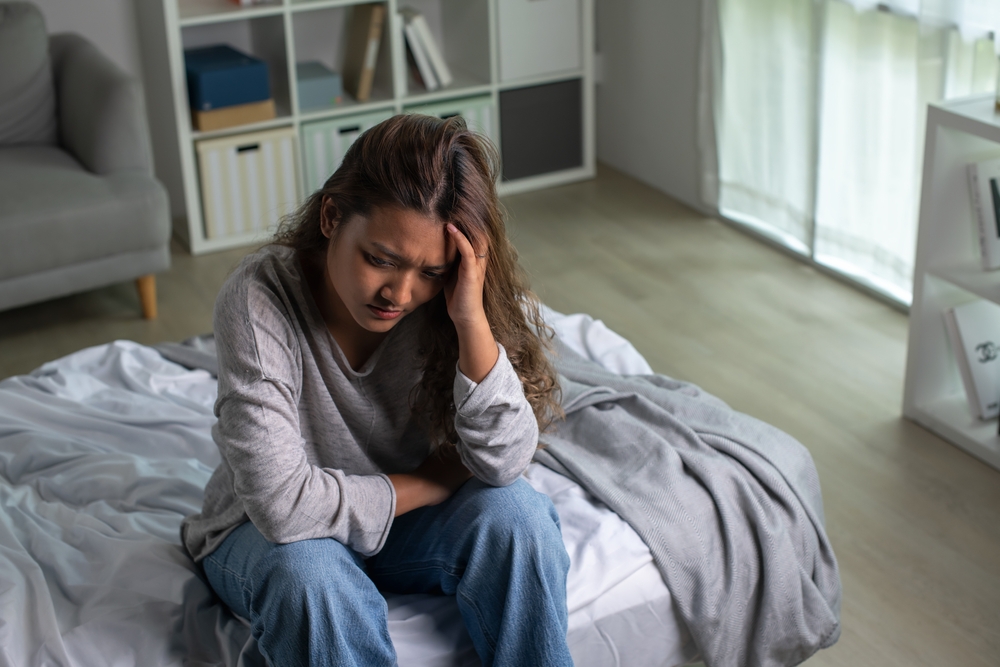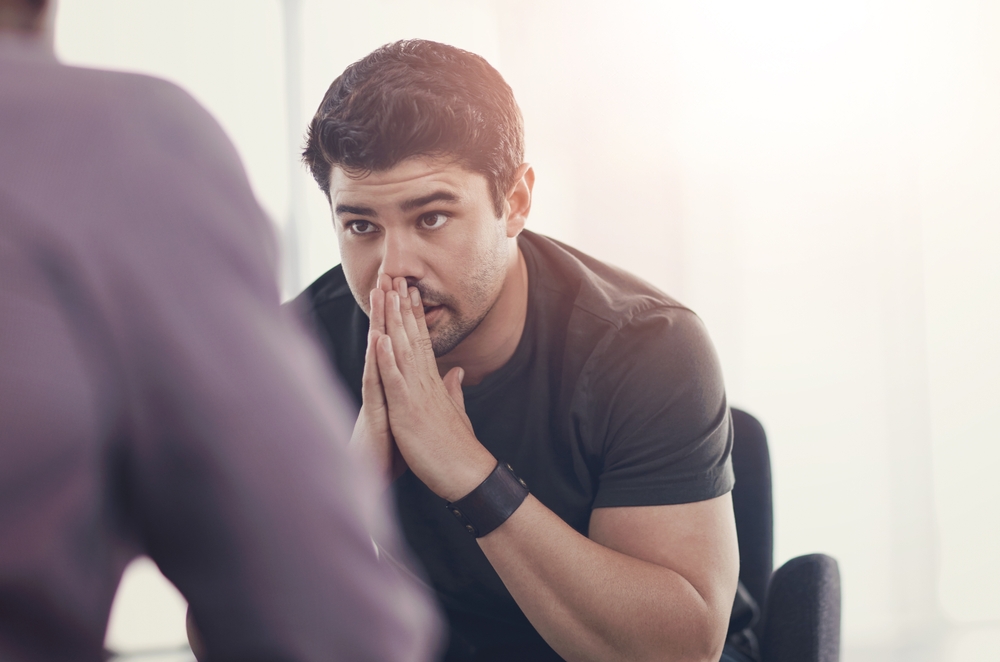Last Updated:
May 16th, 2025
Anxiety and Addiction | Symptoms and Support Options
What is anxiety?
Anxiety is something everyone experiences at some point in their lives. It’s a natural response to stress, uncertainty or danger, helping us stay alert and react to challenges. But for some, anxiety is a persistent, overwhelming force that can take over daily life.
When anxiety becomes constant, it can make even simple tasks feel daunting. It may cause physical symptoms like a racing heart or tense muscles, or it might show up as excessive worry that won’t switch off. In these cases, expert help is often needed to regain control.
Therapy, lifestyle changes, and, in some cases, medication can make a huge difference, helping to manage anxiety so it no longer dictates how life is lived.

Are there different types of anxiety?
Anxiety isn’t a one-size-fits-all experience. While everyone feels anxious from time to time, some people struggle with specific types of anxiety that affect their daily lives in different ways. Below are some of the most common forms of anxiety, each with its own set of challenges and symptoms.
Generalised anxiety disorder (GAD)
GAD causes persistent and excessive worry about everyday situations, even when there’s no clear reason to be anxious. People with GAD often struggle to relax and may experience physical symptoms like headaches, muscle tension or trouble sleeping. Their anxiety can shift from one concern to another, making it difficult to find relief.
Social anxiety disorder
Social anxiety goes beyond shyness, triggering intense fear in social situations like public speaking or casual conversations. People often worry about being judged or embarrassed, leading to avoidance of interactions. Physical symptoms like sweating, trembling and a racing heart can overwhelm social settings.
Panic disorder
Panic disorder involves sudden, intense panic attacks that can feel like a heart attack. Symptoms include shortness of breath and an overwhelming sense of losing control. The unpredictability of these attacks often leads to avoidance of certain places or situations.
What about OCD and PTSD?
Obsessive-compulsive disorder (OCD) and post-traumatic stress disorder (PTSD) were once classified as anxiety disorders but are now recognised as separate conditions due to their unique symptoms and causes. While both can involve anxiety, OCD is characterised by compulsions and intrusive thoughts, while PTSD is linked to trauma and its long-term effects. Despite these differences, anxiety still plays a significant role in both conditions.
The link between anxiety and addiction
Anxiety and addiction are deeply connected in ways that aren’t always easy to separate. Some people turn to substances to ease their anxious thoughts, while others find addiction itself creates anxiety that didn’t exist before. The link is complex, but below, we explore how anxiety can contribute to addiction and how addiction can, in turn, fuel anxiety.
How anxiety can influence drug addiction
Using substances to cope
For many people, substances become a way to escape the constant worry that anxiety brings. Alcohol can quiet overthinking, benzodiazepines can ‘take the edge off’, and stimulants can create a temporary sense of control. But while these effects may feel like relief, they’re short-lived. Over time, the brain starts to rely on these substances, making it harder to function without them. What starts as a coping mechanism can quickly spiral into dependence.
Social anxiety and substance use
For those who struggle with social anxiety, situations that others find easy (like small talk, work events or meeting new people) can feel exhausting. Some turn to alcohol or drugs to push through, feeling more relaxed and confident in the moment. But this can lead to a dangerous cycle where substances become a crutch, making it even harder to face social situations without them.
Heightened sensitivity to drug usage
Anxiety keeps the brain in a constant state of alert. When relief comes in the form of drugs or alcohol, the contrast can feel even more powerful, making someone more likely to keep using. Over time, the brain learns to associate substances with relief, making addiction more likely to take hold.
How drug addiction can cause anxiety
Withdrawal and rebound anxiety
Many substances, especially those that depress or stimulate the nervous system, leave the brain struggling to adjust when they wear off. This can cause withdrawal symptoms like panic, agitation and overwhelming worry. For some, this cycle becomes impossible to break—substances are used to stop the withdrawal, but that only prolongs the problem.
Long-term impact on the brain
Addiction rewires the brain, particularly in areas responsible for mood regulation. Over time, it becomes harder for the brain to produce feelings of calm or contentment without substances naturally. This can potentially cause the development or ‘unlocking’ of long-term anxiety, even if they’re no longer using drugs or alcohol.
The anxiety of addiction’s consequences
Addiction can turn life upside down, creating financial strain and leading to feelings of guilt or shame. The weight of these struggles can fuel anxiety, making it even harder to break free from the cycle of substance use.

Does anxiety and addiction require rehab?
When anxiety and addiction coexist, recovery becomes even more challenging. Substances often serve as a coping mechanism, masking anxious thoughts and feelings. When they’re removed, anxiety can intensify, making it harder to stay on track.
If left unmanaged, anxiety can trigger cravings, while addiction worsens anxious symptoms, creating a cycle that’s difficult to break alone. Inpatient rehab provides a structured, supportive environment where both conditions are treated together, ensuring lasting recovery.
With the right support, breaking free from addiction doesn’t have to mean battling anxiety alone.
What are the next steps?
If anxiety and addiction are controlling your life, you don’t have to face them alone. At Addiction Helper, we connect you with expert treatment options that address both conditions, giving you the support needed for lasting recovery. Call us today for free, confidential advice and take the first step towards a healthier, anxiety-free future.
Our compassionate team are ready and available to take your call, and guide you towards lasting the lasting addiction recovery you deserve.
Frequently Asked Questions
(Click here to see works cited)
- Ferguson, Sian. “Is OCD Considered an Anxiety Disorder?” Healthline, Healthline Media, 13 Dec. 2023, www.healthline.com/health/ocd/is-ocd-an-anxiety-disorder.
- “Va.Gov: Veterans Affairs.” PTSD History and Overview, 31 Jan. 2007, www.ptsd.va.gov/professional/treat/essentials/history_ptsd.asp.
- Brady KT, Haynes LF, Hartwell KJ, Killeen TK. Substance use disorders and anxiety: a treatment challenge for social workers. Soc Work Public Health. 2013;28(3-4):407-23. doi: 10.1080/19371918.2013.774675. PMID: 23731428; PMCID: PMC3775646.
- Book SW, Thomas SE, Smith JP, Miller PM. Severity of anxiety in mental health versus addiction treatment settings when social anxiety and substance abuse are comorbid. Addict Behav. 2012 Oct;37(10):1158-61. doi: 10.1016/j.addbeh.2012.04.016. Epub 2012 May 7. PMID: 22658305; PMCID: PMC3389124.
- Clinical Guidelines for Withdrawal Management and Treatment of Drug Dependence in Closed Settings. Geneva: World Health Organization; 2009. 4, Withdrawal Management. Available from: https://www.ncbi.nlm.nih.gov/books/NBK310652/
- Batchelder AW, Glynn TR, Moskowitz JT, Neilands TB, Dilworth S, Rodriguez SL, Carrico AW. The shame spiral of addiction: Negative self-conscious emotion and substance use. PLoS One. 2022 Mar 18;17(3):e0265480. doi: 10.1371/journal.pone.0265480. PMID: 35303025; PMCID: PMC8932605.

